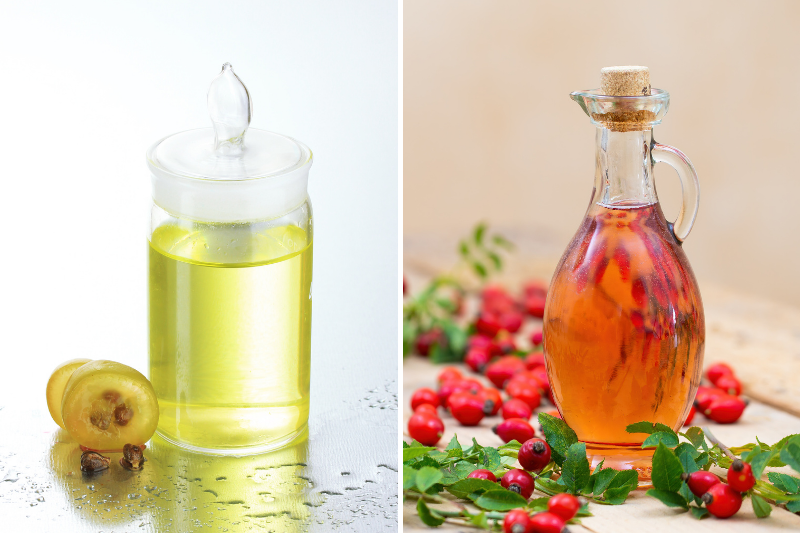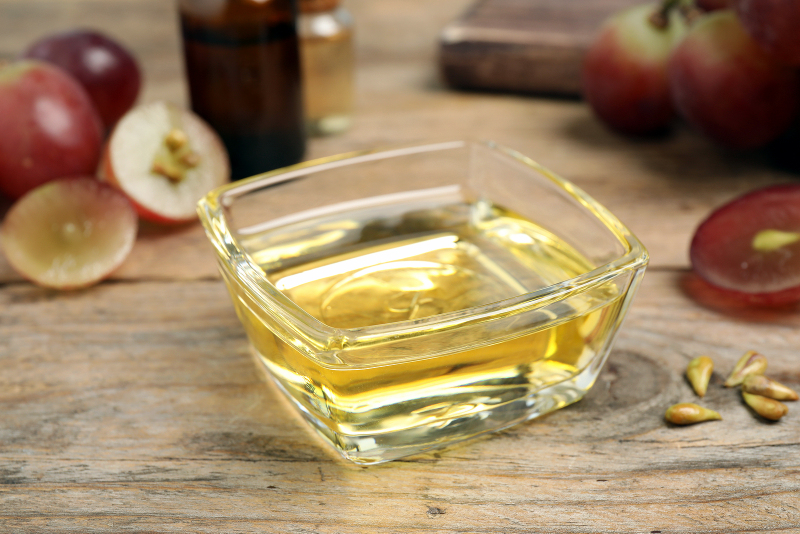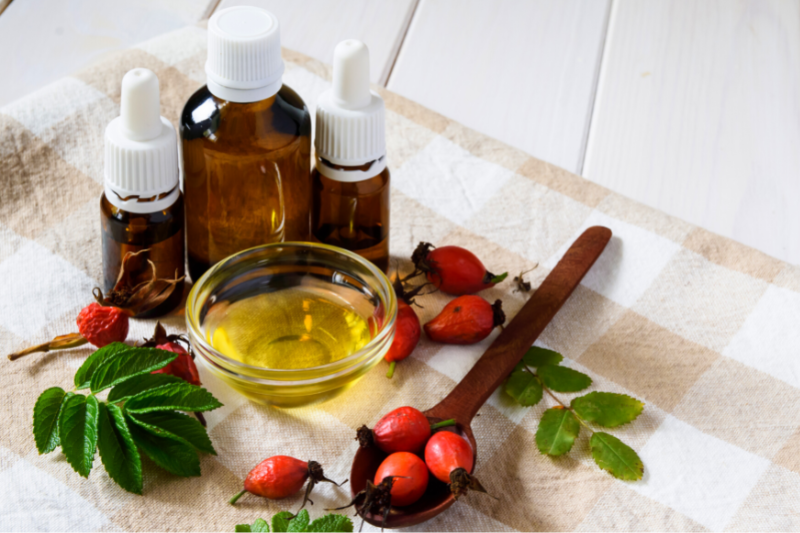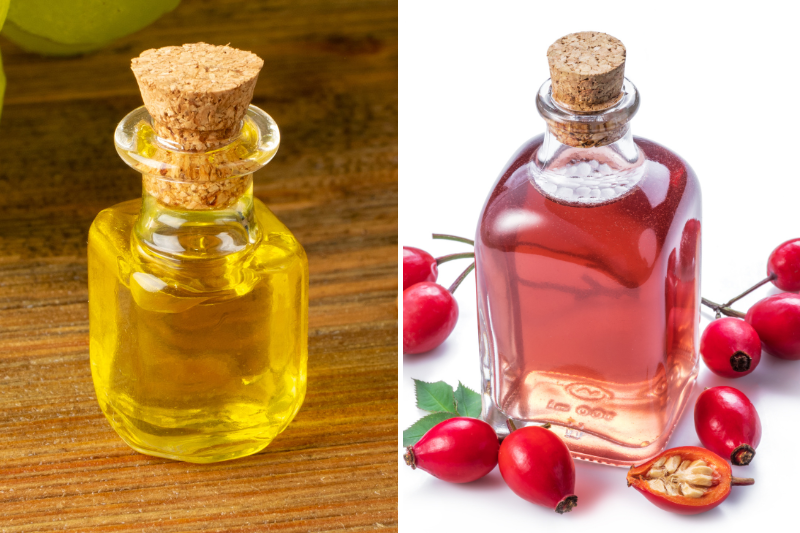Are you interested in learning about grapeseed oil and rosehip oil? Which is the best and when? Then you have come to the right site! In this guide, I will discuss all you want to know about these two great beauty oils.
Grapeseed oil and Rosehip oil are both popular natural skin care oils that are great for the skin. Rosehip oil and grapeseed oil both contain beneficial nutrients for the skin and can be used on the face to nourish the skin. They can be used to make many skin care products and as carrier oils for your essential oils.

Despite being alike in many ways, they do have their differences. It depends what you are looking for out of a beauty oil to address your personal skin care needs which is the best option for you.
Below, I will take you through the similarities, differences and more to allow you to decide which is best for your skin needs. Keep reading to find out.
What Is Grapeseed Oil?

Grapeseed oil is made from grape seeds. It is a lightweight carrier oil that can be used for applications like beauty and cooking. Grapeseed oil has traditionally been made as a byproduct of the wine industry. Wine is made by pressing grapes, and the grapeseeds that are left over are extracted for their oil.
Grapeseed oil is a popular beauty product due to its lightweight texture and its ability to leave the skin feeling soft and supple, and well moisturized. It absorbs quickly into the skin and has a soothing effect on dry skin.
Grapeseed oil is also known to contain anti-inflammatory and anti-microbial qualities, antioxidants, omega fats and vitamins – all of which are great for your skin.
Benefits Of Grapeseed Oil
There are plenty of benefits to using grapeseed oil, and I have listed a few of these below.
All Skin Types
All skin types can benefit from using grapeseed oil. It contains high amounts of particular fatty acids and anti-microbial properties which may be helpful for those with acne. It is great for those with dry, mature or oily skin types. However, those with acne prone skin should perform a test patch first to be on the safe side.
Lightweight and Fast Absorbing
Grapeseed oil absorbs quickly into the skin and is a lightweight oil. This makes it a great option for using as a carrier oil with your favorite essential oils.
Evens Complexion
Grapeseed oil contains a particular antioxidant known as proanthocyanidin which has been said to even the skin’s complexion when applied frequently enough.
What Is Rosehip Oil?

Rosehip oil is a popular skin care product that is made from a popular species of rosehip bush known as rosa subiginosa and rosa canina which are most often sourced in Chile.
Rosehip oil is produced from the rosehip fruit’s flesh, skin and seed. The oils pressed from the rosehip fruit contain high amounts of antioxidants and essential fatty acids, which is great for the skin. Not only that, but it also contains provitamin A, also known as beta carotene, which is fantastic for the skin.
Benefits Of Rosehip Oil
There are plenty of benefits to using rosehip oil on your skin, and I have listed a few of these below.
Anti-Ageing
Rosehip oil contains high amounts of essential fatty acids, primarily omega three and linoleic acid. It contains antioxidants, beta-carotene and various vitamins and minerals. These nutrients are great for the skin and have been found to provide skin cell regeneration which can help reduce the signs of ageing.
Moisturizes and Soothes
Rosehip oil, as mentioned above, contains many nutrients that are great for your skin. These nutrients also work for your skin to provide deep moisturization, and because it contains vitamin E, it also has a soothing effect on the skin.
All Skin Types
Rosehip oil is great in how it can be used by all skin types, even those with acne-prone skin. Because rosehip oil provides anti-microbial and anti-inflammatory properties, it has a low comedogenic rating.
It is a good choice of oil for those with acne, dryness, redness and more. Although, as mentioned previously, it is always a good idea to perform a test patch on acne-prone skin.
Grapeseed Oil Vs Rosehip Oil

So, what are the similarities and differences between these two oils? The main similarities and differences come from their varying nutrients and chemical compounds.
Below I take you through some of the main similarities and differences between these two oils to help you decide which is better suited to your needs.
Similarities Between Grapeseed Oil And Rosehip Oil
All Skin Types
Grapeseed oil and Rosehip oil both contain anti-microbial properties, are low on the comedogenic scale, and are lightweight oils that absorb quickly into the skin.
Moisturising And Soothing
Grapeseed and rosehip oil contain essential fatty acids and antioxidants that are both moisturising and soothing for your skin. These antioxidants contain anti-inflammatory properties in small amounts.
Anti-Ageing
Both grapeseed oil and rosehip oil contain high amounts of antioxidants and essential fatty acids.
Although they do vary in the antioxidants and fatty acids they supply to the skin, they both play a role in reducing the signs of ageing.
What Is The Difference Between Grapeseed And Rosehip Oil?
Texture and Color
Grapeseed oil is very lightweight and translucent in color, making it a great choice for those looking to use it as a carrier oil or for making beauty products, as it will not disrupt the scent of essential oils, etc.
Rosehip oil is yellow in color and is a thicker oil. Although it is lightweight, it is not as lightweight as grapeseed.
Antioxidants
Grapeseed oil and Rosehip oil both contain high levels of antioxidants. However, they differ in what antioxidants they offer.
Rosehip oil contains a higher level of beta-carotene, Grapeseed oil, in comparison, contains a higher level of vitamin E compared with rosehip oil.
Fatty acids
Both rosehip oil and grapeseed oil contain high levels of essential fatty acids, but their fatty acid profiles vary. Grapeseed oil is made up of linoleic acid and oleic acid, whereas rosehip oil is mainly linoleic acid and alpha linolenic acid.
Rosehip Oil Vs Grapeseed Oil For Skin

Rosehip oil or grapeseed oil for the skin? Now we have gone through some of the similarities and differences between these two oils, it is up to you to decide which is best for your skin.
Rosehip oil will deeply moisturise and soothe your skin and may take longer to absorb than grapeseed. Grapeseed oil is lightweight compared to rosehip oil and will absorb quickly into your skin.
Though low in odor, rosehip oil provides more of a scent than grapeseed, so if you want to mix your oil with essential oils, you may find grapeseed the better choice.
Grapeseed Oil Vs Rosehip Oil For Acne
Grapeseed oil and rosehip oil both contain antioxidants that provide some anti-microbial and anti-inflammatory activity. When dealing with acne, it is best to tread on the side of caution and spot test with either oil to see which best reacts with your skin.
Rosehip oil is a slightly thicker and slower-absorbing oil than grapeseed so you may find grapeseed oil a better option for acne-prone skin.
Can I Mix Grapeseed Oil With Rosehip Oil?
Yes, absolutely. Mixing grapeseed oil with rosehip oil is a great way to benefit from both of the nutrient profiles.
Conclusion
So is grapeseed oil better than rosehip oil? It really depends on what you are using the oil for and your personal preferences.
I hope you have enjoyed this guide, where we discussed grapeseed oil vs rosehip oil, and I have answered all questions you have regarding the two.
You can also learn the difference between rosehip oil and rosehip seed oil here, how rosehip oil compares to jojoba oil here or more guides to using rosehip oil for your DIY recipes here. You can also find a guide to using rosehip oil and retinol here.


Comments are closed.